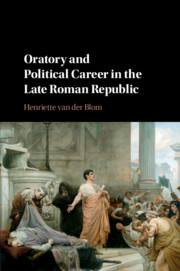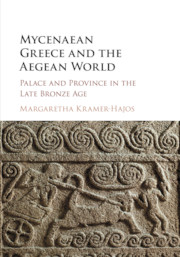Refine search
Actions for selected content:
23990 results in Ancient history

Oratory and Political Career in the Late Roman Republic
-
- Published online:
- 05 August 2016
- Print publication:
- 15 August 2016

Mycenaean Greece and the Aegean World
- Palace and Province in the Late Bronze Age
-
- Published online:
- 05 August 2016
- Print publication:
- 15 August 2016
Notes on contributors
-
- Book:
- Theologies of Ancient Greek Religion
- Published online:
- 05 August 2016
- Print publication:
- 03 August 2016, pp xi-xiv
-
- Chapter
- Export citation
Chapter 4 - Who’s afraid of Cypselus?
-
-
- Book:
- Theologies of Ancient Greek Religion
- Published online:
- 05 August 2016
- Print publication:
- 03 August 2016, pp 62-88
-
- Chapter
- Export citation
Chapter 13 - Plato and the secularisation of Greek theology
-
-
- Book:
- Theologies of Ancient Greek Religion
- Published online:
- 05 August 2016
- Print publication:
- 03 August 2016, pp 301-316
-
- Chapter
- Export citation
Chapter 1 - Introduction
-
-
- Book:
- Theologies of Ancient Greek Religion
- Published online:
- 05 August 2016
- Print publication:
- 03 August 2016, pp 1-11
-
- Chapter
- Export citation
Chapter 11 - Theologies of statues in Classical Greek art
-
-
- Book:
- Theologies of Ancient Greek Religion
- Published online:
- 05 August 2016
- Print publication:
- 03 August 2016, pp 249-280
-
- Chapter
- Export citation
Index
-
- Book:
- Theologies of Ancient Greek Religion
- Published online:
- 05 August 2016
- Print publication:
- 03 August 2016, pp 403-423
-
- Chapter
- Export citation
Chapter 2 - The story of theology and the theology of the story
-
-
- Book:
- Theologies of Ancient Greek Religion
- Published online:
- 05 August 2016
- Print publication:
- 03 August 2016, pp 12-34
-
- Chapter
- Export citation
Chapter 14 - Providence and Religion in Middle Platonism
-
-
- Book:
- Theologies of Ancient Greek Religion
- Published online:
- 05 August 2016
- Print publication:
- 03 August 2016, pp 317-338
-
- Chapter
- Export citation
Chapter 8 - Gods and men in ancient Greek conceptions of lawgiving
-
-
- Book:
- Theologies of Ancient Greek Religion
- Published online:
- 05 August 2016
- Print publication:
- 03 August 2016, pp 176-204
-
- Chapter
- Export citation
Chapter 3 - Theologies of the family in Homer and Hesiod
-
-
- Book:
- Theologies of Ancient Greek Religion
- Published online:
- 05 August 2016
- Print publication:
- 03 August 2016, pp 35-61
-
- Chapter
- Export citation
Chapter 10 - Sacrificial theologies
-
-
- Book:
- Theologies of Ancient Greek Religion
- Published online:
- 05 August 2016
- Print publication:
- 03 August 2016, pp 233-248
-
- Chapter
- Export citation
Note on spellings and abbreviations
-
- Book:
- Theologies of Ancient Greek Religion
- Published online:
- 05 August 2016
- Print publication:
- 03 August 2016, pp xvii-xviii
-
- Chapter
- Export citation
Chapter 12 - The gods in the Athenian assembly
-
-
- Book:
- Theologies of Ancient Greek Religion
- Published online:
- 05 August 2016
- Print publication:
- 03 August 2016, pp 281-300
-
- Chapter
- Export citation
Chapter 7 - Polytheism and tragedy
-
-
- Book:
- Theologies of Ancient Greek Religion
- Published online:
- 05 August 2016
- Print publication:
- 03 August 2016, pp 153-175
-
- Chapter
- Export citation
Bibliography
-
- Book:
- Theologies of Ancient Greek Religion
- Published online:
- 05 August 2016
- Print publication:
- 03 August 2016, pp 359-402
-
- Chapter
- Export citation
Contents
-
- Book:
- Theologies of Ancient Greek Religion
- Published online:
- 05 August 2016
- Print publication:
- 03 August 2016, pp vii-viii
-
- Chapter
- Export citation
Chapter 15 - Narratives of continuity and discontinuity
-
-
- Book:
- Theologies of Ancient Greek Religion
- Published online:
- 05 August 2016
- Print publication:
- 03 August 2016, pp 339-358
-
- Chapter
- Export citation
Preface
-
- Book:
- Theologies of Ancient Greek Religion
- Published online:
- 05 August 2016
- Print publication:
- 03 August 2016, pp xv-xvi
-
- Chapter
- Export citation
